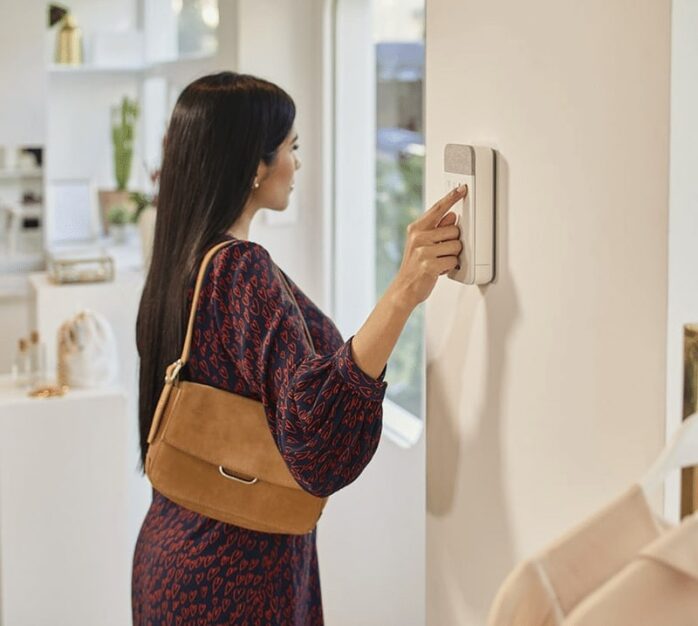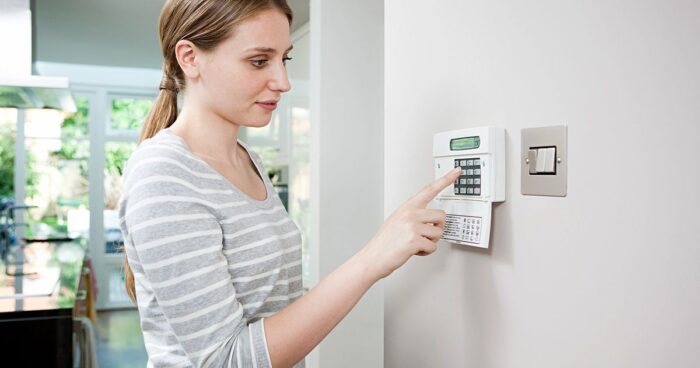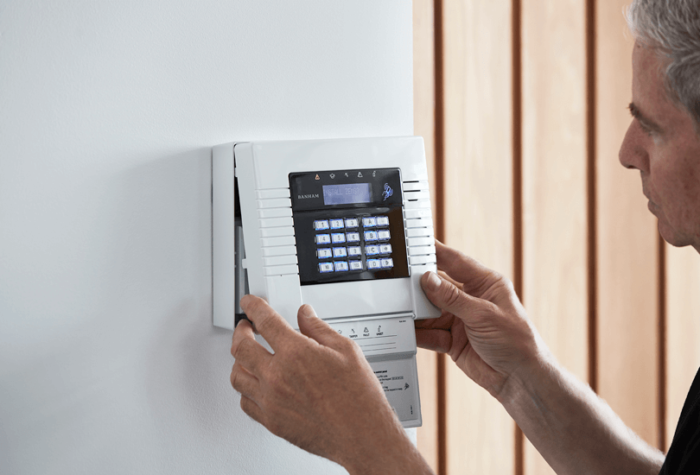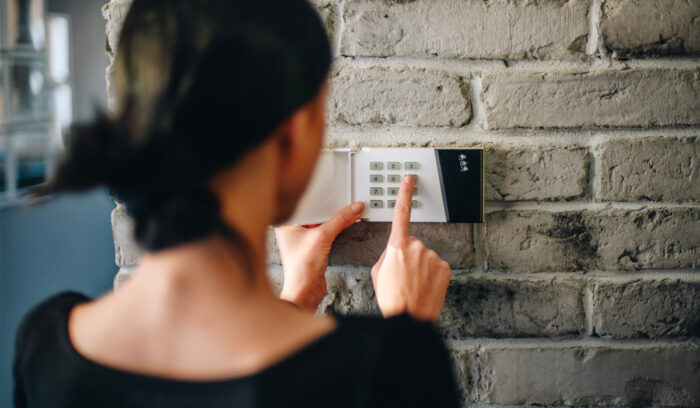
In the age of rapid technological advancement, our homes and businesses are becoming more connected and digital. As we transition into this brave new world, it’s essential to ensure that we do so securely.
Wireless burglar alarm systems are at the forefront of this transformation, promising advanced security and peace of mind. But the question remains, are they truly worth the investment? Lucid Fire & Security Ltd has both an answer and a solution!
The Basics of Wireless Security
A wireless burglar alarm system is a security system designed to detect unauthorized entry into a building or property. Unlike their wired counterparts, these systems rely on wireless communication channels to connect sensors, detectors, cameras, and alarms to the main control panel.

How Do They Work?
These systems operate using radio frequency (RF) signals. When a sensor detects an intrusion, it sends a signal to the control panel. The control panel then evaluates the signal and, based on its programming, decides whether to sound an alarm, send notifications, or both.
The Pros of Wireless Burglar Alarm Systems
One of the main advantages of wireless systems is the ease of installation. There’s no need to drill holes, pull wires through walls, or deal with complex cable setups. For renters or those who wish to avoid permanent modifications to their property, this is a significant boon.
Flexibility
Wireless systems offer unparalleled flexibility. You can quickly move sensors and other components around as needed without worrying about wires. This adaptability makes it easier to expand your system or take it with you if you relocate.

Remote Access & Control
Modern wireless alarm systems often integrate with smartphones and tablets, allowing users to monitor and control their security from anywhere in the world. This remote capability not only offers peace of mind but can also enhance security by allowing prompt responses to alerts.
Smart Home Integration
Many wireless systems can seamlessly integrate with other smart home devices, from lights to thermostats, enabling a cohesive and connected home environment.
Fewer Vulnerabilities to Cutting
Wired systems can sometimes be disabled by cutting their physical cables. Wireless systems don’t have this issue, making them less vulnerable to certain sabotage methods.

The Cons of Wireless Burglar Alarm Systems
Wireless systems, by nature, rely on batteries. This need means you’ll have to replace or recharge batteries occasionally, adding to the maintenance required.
Interference Issues
While rare, other electronic devices or thick walls might cause interference with the RF signals, potentially decreasing the reliability of the system.
Limited Range
Wireless systems have a specific range within which the sensors can communicate with the control panel. In extensive properties, signal boosters may be needed to ensure all areas are covered.
Higher Initial Cost
While wireless systems offer numerous benefits, they often come with a higher upfront cost compared to their wired counterparts, mainly because of the advanced technology involved.

Considering the Cost vs. Benefit
When weighing the worth of a wireless burglar alarm system, one of the first things people consider is the monetary cost. The initial setup, monthly monitoring fees (if any), and maintenance costs are critical factors.
Peace of Mind
You can’t put a price on peace of mind. Knowing your property is secure, even when you’re not there, can provide immeasurable emotional value.
Potential Insurance Reductions
Many insurance companies offer discounts on homeowner’s or renter’s insurance when you have a monitored security system. These savings can offset some of the costs of the system.
Potential for Deterrence
A visible security system can deter potential burglars. The mere presence of security cameras, alarms, or signs can make your property a less attractive target.

The Big Question: Are They Worth It?
The answer to this question is multifaceted and depends largely on individual needs and values.
Safety First
For those living in areas with higher crime rates or those with valuable assets to protect, the answer might lean more towards “yes.” The potential losses from a burglary or other security breach can far outweigh the costs of the system.
Personal Peace
For others, the primary benefit might not be strictly monetary. The peace of mind provided by knowing that your loved ones and belongings are safe can be priceless.
Consider Your Lifestyle
If you frequently travel or have a large property, the remote monitoring and control features of wireless systems can be invaluable. Additionally, if you’re a renter or plan to move soon, the flexibility of a wireless system might make it more appealing.
Integration Capabilities
One of the notable advantages of wireless systems is their ability to integrate with other smart devices. Before investing, ensure the system you’re considering can work seamlessly with any existing or future smart devices you plan on incorporating.

Encryption and Cybersecurity
With the convenience of remote monitoring comes the potential vulnerability of cyberattacks. Opt for systems that offer robust encryption for their wireless communications and continually update to address cybersecurity threats.
Scalability
As your security needs change, your system should be able to adapt. Whether it’s adding more sensors, integrating new smart devices, or upgrading for newer features, ensure the system you choose is scalable.
Professional vs. Self-monitoring
Some wireless systems offer professional monitoring services, where a third-party company oversees alerts and can contact emergency services if necessary. Others may allow for self-monitoring, where you take charge of receiving and responding to alerts. Determine which option aligns with your comfort level and lifestyle.
Customer Support
Technical glitches, system updates, or simple queries – having reliable customer support can make all the difference in your overall experience. Research reviews about the company’s after-sales service and responsiveness.
The Environmental Aspect
Security isn’t just about preventing break-ins; it’s also about creating a secure environment inside the house. Some advanced systems offer environmental sensors that can detect:
- Smoke and Fire: Rapid response to these threats can prevent property damage and save lives.
- Carbon Monoxide: A silent and odorless killer, having a detector for this gas is invaluable.
- Water Leaks: Early detection can prevent significant damage and costly repairs.
By integrating these sensors, you’re not just guarding against burglars but also ensuring a safer living environment.

FAQs
What’s the difference between wired and wireless burglar alarm systems?
Wired alarm systems require physical cables to connect sensors and cameras to the main control panel. They often need professional installation and can be more permanent. Wireless systems, on the other hand, use radio frequency (RF) signals to communicate between devices and the control panel. They are generally easier to install, offer flexibility in placement, and can be moved easily.
How reliable are wireless burglar alarm systems given they operate on batteries?
While wireless systems do rely on batteries, many modern systems come with long-lasting battery life and often provide alerts when battery levels are low. Regular maintenance checks and prompt battery replacements ensure that the system remains reliable.
Are wireless burglar alarm systems vulnerable to hacking?
Like any connected device, there’s a potential for hacking. However, reputable wireless security systems use advanced encryption and regular software updates to minimize vulnerabilities. It’s essential to choose a system known for its robust cybersecurity measures and to frequently change passwords.
Can I self-install a wireless burglar alarm system or do I need professional help?
One of the benefits of wireless systems is that they are typically easier to install than wired systems. Many are designed for DIY installation, with user-friendly guides and customer support available. However, if you’re unsure or prefer a professional touch, many companies offer installation services.
How far can wireless sensors be placed from the main control panel?
The range can vary based on the system and the building’s structure. However, most wireless systems can cover the average-sized home without issues. For larger properties or houses with thick walls, you may need signal boosters or repeaters to ensure all areas are covered.
Do wireless burglar alarm systems integrate with other smart home devices?
Many modern wireless security systems are designed to integrate seamlessly with other smart home devices, such as lights, locks, and thermostats. Always check the system’s compatibility with your existing or planned devices to ensure a cohesive setup.
Conclusion
Navigating the realm of home security can often feel like venturing into a labyrinth, with its twists, turns, and myriad options. Yet, at the heart of this journey lies a simple, universal truth: the safety and well-being of our loved ones and cherished possessions are paramount. As technology evolves, it continually equips us with innovative tools, such as wireless burglar alarm systems, that blend seamlessly into our digital age.
While they come with their set of questions, as any groundbreaking innovation does, they also open doors to enhanced security, convenience, and peace of mind. In the dynamic dance between modern living and security, wireless systems certainly have carved a rhythmic, promising niche. Choosing one might just be the step that sets your mind at ease, painting a future where you’re always connected, always secure.











